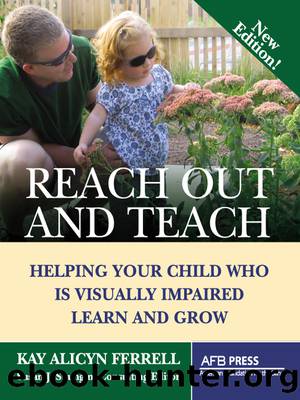Reach Out and Teach by Ferrell Kay Alicyn;Spungin Susan J.;

Author:Ferrell, Kay Alicyn;Spungin, Susan J.; [EVA BRANN]
Language: eng
Format: epub
Publisher: American Foundation for the Blind Press
Published: 2012-08-28T00:00:00+00:00
Tactile Preferences
Although your child may be quite happy to touch things herself to gather information, you may find that she may not allow you to touch her to give her information. This tendency is sometimes called tactile defensiveness or tactile selectivity (also discussed in Chapter 5 in reference to touch). You may have seen evidence of it during her first year, too, but your child's preferences regarding touch may become more pronounced during this age. If that is the case, the same activities described in Chapter 5 that you did with her as an infant will tend to increase her openness to different tactile sensations, such as using a firm touch and providing lots of different textures in her environment for her to feel. As she gains better use of her hands, this tactile selectivity will, in all likelihood, gradually disappear. If you feel as though it may be going on a little too long, look at her development in other areas, particularly motor or movement skills. Is she crawling yet? If not, this could mean that she has not had enough feedback to her hands and arms and does not yet know what these body parts are to be used for, and she needs more practice in weight bearing and weight shifting on her tummy to give feedback to her hands and arms and to build her strength. Be patient, but if you think you might need some help with your child's tactile selectivity, talk with the members of the early intervention team you may be working with.
Remember that the developmental domains are interconnected, and progress in one area, such as gross motor skills, affects the development in other areas, such as fine motor skills. Similarly, progress in fine motor skills affects the development of adaptive skills, such as eating. The motor skills discussed in the Chapter 5âweight bearing, pushing up in prone (tummy) position, crawling, reachingâprovide feedback to the hands and facilitate the refinement of grasp. In turn, the refinement of grasp makes independent eating possible, and eating makes spoken language possible because of the continuing development of the same muscles used in both these activities. Always try to connect what's going on in one developmental domain with what's going on in another, and keep in mind that everything's related.
Download
This site does not store any files on its server. We only index and link to content provided by other sites. Please contact the content providers to delete copyright contents if any and email us, we'll remove relevant links or contents immediately.
Chicken Soup for the Soul Presents Teens Talkin' Faith by Jack Canfield(625)
Understanding PDA Autism in Kids: A Guide for Parents and Teachers to Support Neurodiverse Learners by Jehu Len(550)
The Victorian Era: A Captivating Guide to the Life of Queen Victoria and an Era in the History of the United Kingdom Known for Its Hierarchy-Based Social Order by Captivating History(422)
Brain Teasers to Build Critical Thinking Skills by Safarova Kris(411)
Brain Teasers to Build Critical Thinking Skills: Brain Exercises for Tech, Banking, Case Interview Prep, and to Keep Your Mind Sharp by Kris Safarova(411)
100 Ideas for Secondary Teachers: Engaging Parents by Janet Goodall & Kathryn Weston(386)
Python 101 - Fundamentals by Sam(373)
Critical Curriculum Leadership : A Framework for Progressive Education by Rose M. Ylimaki(359)
Writing Solid Code: Development Philosophies for Writing Bug-Free Programs by Steve Maguire(353)
The Art of Emotional Validation: Improve Your Communication Skills and Transform Your Relationships by Validating Emotions and Feelings by Emily Wright(338)
Intersectionality in Educational Research by Dannielle Joy Davis; James L. Olive; Rachelle J. Brunn-Bevel; Susan R. Jones(329)
The Knights Templar: An Enthralling History of the Rise and Fall of the Most Influential Catholic Military Order by Wellman Billy(327)
A Beginner's Guide to SSD Firmware by Unknown(325)
The Future Knowledge Compendium by Ellyard Peter;(319)
How to be assertive in any situation by Hadfield Sue & Hasson Gill(308)
Making Connections in and Through Arts-Based Educational Research by Hala Mreiwed Mindy R. Carter Sara Hashem Candace H. Blake-Amarante(305)
What Every Teacher Should Know about Learning, Memory, and the Brain by Tileston Donna E. Walker;(305)
Foundations of Educational Research by Victoria Elliott(304)
Message from the Pleiades; The Contact Notes of Eduard Billy Meier v1 only by unknow(301)
